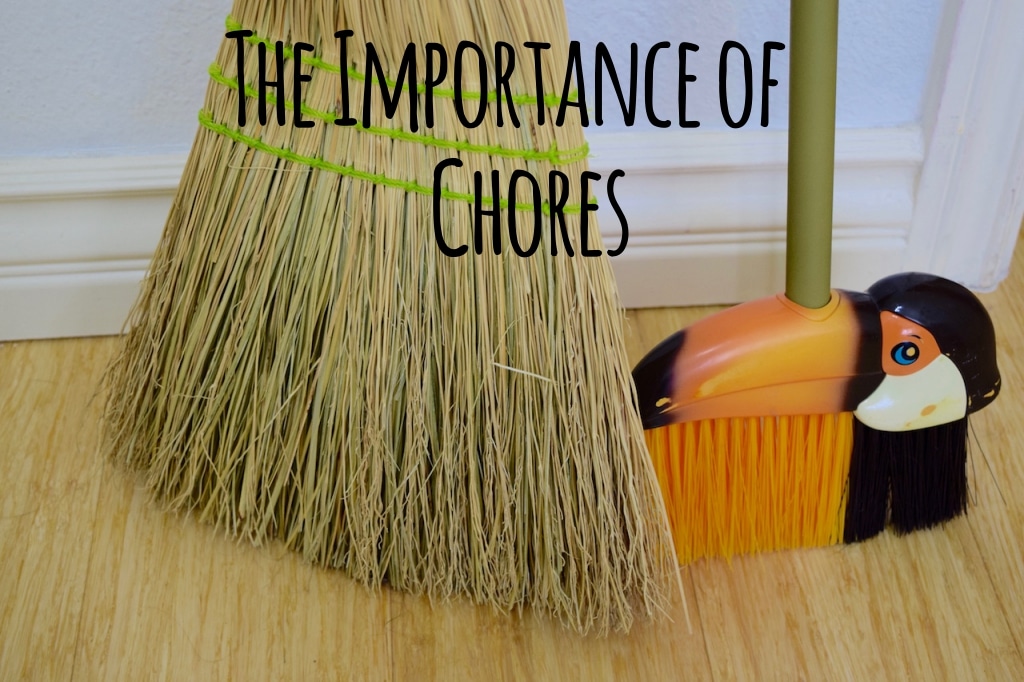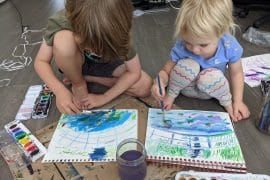When Dominik was around a year old, I took him to a Montessori parent and child class. I was hoping to meet some other parents, have Dominik interact with children his age, and to get parenting tips. One of my favorite things that we learned was having children clean up after themselves. It wasn’t something that I had really thought of, after all, he was only a year old. But I was amazed that when given direction, he happily cleaned the table after a snack. The Montessori philosophy on children cleaning is to learn by doing and to put kids in charge more often.
Dominik is still not quite old enough to understand the concept of “chores” or to be truly responsible for anything, but he does participate in my daily cleaning and other household jobs. And as he grows, he will take on more responsibility and have his own chores. But he helps with nearly every one of my chores, from cooking to cleaning to folding laundry.
The good news? Assigning chores for kids may be more important than just getting some extra help around the house.
A recent study of children who were responsible for something like a chore found that the benefits extended into adulthood. Marty Rossmann of the University of Mississippi collected data over a period of 25 years on children who were asked to do chores. He found that children who had chores were more likely to be more successful in their careers, have better relationships, and be more empathetic. But parents are having their children do less than they were asked to do when they were children, according to various polls. But chores really emphasize the importance of hard work, doing things for your family, and self-reliance.
It can be tricky to get kids to do their chores or clean anything, whether it’s reminding them or convincing them. Admittedly, I often dislike my own daily cleaning and routines but I do it because it just needs to be done. And this is the mentality that helps kids to participate. If they hear you complain, they aren’t going to want to do it either because you are making it sound tedious and boring. Here are some tips to helping kids to do their chores:
- Start young. Getting young kids to get into the habit of putting away toys or wiping up the table after a meal makes for a great start to a lifetime of good cleaning habits. It’s easier to start routines when they are toddlers than it is when they are older school children.
- Make it fun. Put on some music and dance while you sweep. Or make up songs to sing while doing the dishes. Dominik likes to simply make sound effects like “bam” when putting blocks away. It’ll make chores nicer for you too.
- Be a model. Children will not magically know how to do chores unless they are taught. Show and explain to them how each things is done, and more than once.
- Create a reward system. Young children do well with something as simple as a sticker chart. The idea is to acknowledge hard work, participation, helpfulness, and good habits. Children love positive reinforcement and attention, and making them feel good about their skills goes a long way in creating healthy habits. But if kids need a little extra push in doing chores, a reward system with a goal like a trip to the movies or a small toy helps to teach them about earning things as well.
- Create a strong routine. The first step in creating good cleaning habits is to start a routine. For example, after mealtime, is clean up time. We put the dishes in the sink, Dominik wipes his hands, his face, and the table. Another routine we have is that on Mondays, we clean the floors. He sweeps with his small broom right along side me. It’s simple and easy and goes a long way.
- Make it part of everyday life. This is the most important part of cleaning and chores. Keeping a house clean and tidy is just part of everyday life. Children are taught to brush their teeth in the morning, put their shoes on before going outside, and to eat with a fork, chores should fall into place as life skills as well. Kids play dress up to learn about roles, to act out what they have learned about life around them. The more kids participate and act out cleaning skills with you during chores, the more they learn.
The type of chores somewhat depend on the age of the child. We only use completely safe substances like vinegar to clean, so Dominik is able to help me with nearly all of the cleaning. The yucky stuff, like cleaning toilets, as well as the physically impossible stuff for him, like taking out the trash, will be saved for when he is older.
It’s also important to note that chores should not be limited to a child’s bedroom or personal things. When chores include things that help the whole family, like sweeping the dining room or putting away dishes, they are learning to cooperate with others, do nice gestures for others, and to work as a family.
Don’t underestimate your child and what he can do. I didn’t think Dominik could help me unload the dishwasher until I showed him how and gave him a chance. You know your child best, follow your instincts. Start be including kiddos in a few cleaning routines and pretty soon chores will be a group effort.





